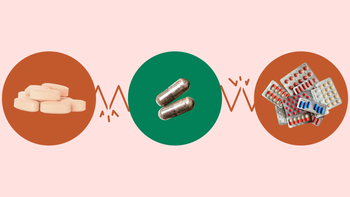
Zinc Supplements: What Are They Good for and How Much Zinc Is Too Much?
Key takeaways:
Zinc is a mineral that supports overall health. It’s found in many foods and drinks and is also available as a dietary supplement.
Zinc supplements are generally well-tolerated. But taking too much zinc can cause side effects like diarrhea, stomach pain, and vomiting.
It’s possible to overdose on zinc supplements. Contact Poison Control at 1-800-222-1222 for advice if you think you’ve accidentally taken too much zinc.
Table of contents

Zinc is an important mineral — or micronutrient — that your body needs to work properly. The body needs zinc to build DNA, protein, and new cells.
Most people get all the zinc they need from their regular diet since many foods are naturally high in zinc. But zinc is also available as a dietary supplement. In general, zinc supplements are safe when they’re taken at recommended doses. But like with all medications and supplements, taking too much zinc can cause side effects and health problems. Zinc overdoses are very uncommon, but they can happen.
Here’s how you can take zinc supplements safely and what to look out for if you think you’ve accidentally taken too much zinc.
Search and compare options
What types of zinc supplements are available?
Zinc supplements are available over the counter (OTC) at retail pharmacies, wellness stores, grocery stores, and from online retailers. Zinc supplements come in many forms including:
Pills
Lozenges
Nasal sprays
Gels
These supplements may contain different forms of zinc like zinc gluconate, zinc sulfate, and zinc acetate. Your body absorbs each of these forms differently. The type of zinc should be included on the “Drug Facts” label along with the percentage of elemental zinc in the supplement.
If you’re taking zinc supplements, it’s best to stick with pills and lozenges. Zinc nasal sprays and gels should be generally avoided because they can affect your sense of smell. In fact, by 2009, the FDA received more than 130 reports of people losing their sense of smell after using nasal zinc products.
Selecting the right zinc supplement for you may seem overwhelming, especially since there are many different products. Checking that the product has the USP Verified Mark can be a good first step. For example, certain Nature Made zinc supplements have gone through testing to make sure what’s listed on the label matches the product.
It’s also important to remember that zinc can be found in other products too, including:
Read more like this
Explore these related articles, suggested for readers like you.
If you’re taking zinc supplements, make sure to check your other supplements and medications to see if they contain zinc. This will help you avoid accidentally doubling and taking too much zinc.
What does zinc do for the body?
Zinc is an essential mineral. That means your body needs a certain amount of zinc to work properly. Zinc helps build cells, proteins, and DNA, which are the building blocks of every organ in the body. So zinc plays a role in keeping every part of your body healthy. It also helps your body with important duties like:
Fighting off infection
Metabolism
Wound healing
Sense of taste and smell
Skin health
How much zinc is too much?
Even though zinc is vital to your health, there can be too much of a good thing. It’s possible to take too much zinc.
In general, adults shouldn’t take more than 40 mg of zinc each day, though the amount your body actually needs each day is much lower. For children and adolescents, ages 18 and younger, the maximum amounts are a bit lower.
Age | Maximum amount of zinc per day |
Birth to 6 months old | 4 mg |
Infants 7 to 12 months old | 5 mg |
Children 1 to 3 years old | 7 mg |
Children 4 to 8 years old | 12 mg |
Children 9 to 13 years old | 23 mg |
Teens 14 to 18 years old | 34 mg |
Adults 19 years and older | 40 mg |
How much zinc is safe to take?
Your age determines how much zinc you can safely take each day. Here’s how much zinc each age group can safely take each day.
Age | Recommended amount per day |
Newborns ages 0 to 6 months | 2 mg |
Infants ages 7 to 12 months | 3 mg |
Children ages 1 to 3 years | 3 mg |
Children ages 4 to 8 years | 5 mg |
Children ages 9 to 13 years | 8 mg |
Teen boys ages 14 to 18 years | 11 mg |
Teen girls ages 14 to 18 years | 9 mg |
Pregnant teens ages 14 to 18 years | 12 mg |
Breastfeeding teens ages 14 to 18 years | 13 mg |
Adult men ages 19 years and older | 11 mg |
Adult women ages 19 years and older | 8 mg |
Pregnant women ages 19 years and older | 11 mg |
Breastfeeding women 19 years and older | 12 mg |
What are the side effects of taking too much zinc?
Taking too much zinc can cause zinc toxicity. Zinc toxicity is rare but can develop if people overdose on zinc by accident or take high doses of zinc for a long time. Symptoms of zinc toxicity include:
Stomach pain
Nausea
Vomiting
Loss of appetite
Headaches
Other medical conditions and illnesses can also cause these symptoms. So it can be hard for people to realize that they’re experiencing zinc toxicity. They might blame their symptoms on something else and continue to take zinc supplements, making the problem worse.
Zinc toxicity will go away once people stop taking too much zinc. But people may still experience long-term side effects from taking too much zinc like a weakened immune system.
Zinc toxicity can also lead to low copper levels because zinc can interfere with how the body absorbs copper. Low copper levels can lead to anemia and low white blood cell counts, which can affect the body’s ability to fight off infections
What medications and supplements should you be careful not to mix with zinc supplements?
Zinc supplements can affect how other medications and supplements work. Keep medication interactions like these in mind:
Antibiotics: Avoid taking quinolone antibiotics, like ciprofloxacin (Cipro), and tetracyclines at the same time as zinc supplements. People can have trouble absorbing these antibiotics if they take them at the same time as a zinc supplement. Take these antibiotics at least 2 hours before, or 4 to 6 hours after, taking a zinc supplement.
Penicillamine: Zinc can lower the absorption of penicillamine, a medication used to treat Wilson’s disease. It’s best to take zinc supplements at least 2 hours before or 2 hours after taking penicillamine. It can also interact with trientine tetrahydrochloride (Cuvrior), a similar medication.
Diuretics: Certain diuretics — like chlorthalidone and hydrochlorothiazide — can lower amounts of zinc in the body. If you take a diuretic, your healthcare professional can tell you if it’s necessary to take any supplements, including a zinc supplement.
It’s a good idea to keep an updated list of your medications on hand. You can show this list to your healthcare professional and pharmacist who can then make sure your medications and supplements won’t interact with zinc.
Can I take zinc and magnesium together?
Yes. In general, you can take zinc and magnesium supplements at the same time. Both minerals are found in multivitamins so you may already be taking them together if you take a daily multivitamin.
Keep in mind that it’s possible to take too much magnesium, too. So make sure to follow recommended daily doses for both magnesium and zinc. Like zinc, magnesium can interact with certain medications and make them less effective. So check with your care team to make sure it’s safe to take magnesium with your current medications and supplements.
How long does it take for zinc supplements to leave my body?
Extra zinc typically stays in your body for about 25 hours (a little more than a day) before leaving your body in your stool.
If you’ve had gastrointestinal surgery or have a condition that affects your gut like ulcerative colitis or Crohn’s disease, you may have trouble absorbing zinc. In these situations, zinc may leave your body faster
What should I do if I’ve taken too much zinc?
If you’re concerned that you or a loved one has taken too much zinc, contact Poison Control at 1-800-222-1222. Poison control specialists can help you determine whether you are at risk for zinc toxicity from accidental zinc overdose. They can also tell you whether you need to go to the emergency room or see a healthcare professional right away.
You may need care in the hospital if you have zinc toxicity. Treatments for zinc toxicity include:
Intravenous (IV) fluids to avoid dehydration
Medications to relieve nausea or stomach upset
Chelation medications, which bind extra zinc so it can leave the body
The bottom line
Zinc is a commonly used dietary supplement that’s available in a variety of products. Most people get enough zinc through their regular diet. Always consider how much zinc you already get from your diet before starting a supplement. Adults should avoid taking more than 40 mg of zinc each day. If you accidentally take more than this, it’s more likely to cause stomach symptoms than any serious health problems. But in rare cases, people develop zinc toxicity from taking too much zinc. If you think you may have taken too much zinc, call Poison Control at 1-800-222-1222.
Why trust our experts?


National Institutes of Health. (2021). Zinc fact sheet for consumers.
National Institutes of Health. (2021). Zinc fact sheet for health professionals.
Rabinovich, D., et al. (2022). Zinc. StatPearls.
Ranasinghe, P., et al. (2018). Pharmacokinetics of zinc in pre-diabetes: A pilot study. Journal of Diabetes, Metabolic Disorders & Control.
United States Pharmacopeia. (n.d.). USP verified products.
U.S. Food and Drug Administration. (2016). Warnings on three Zicam intranasal zinc products.
Wegmüller, R., et al. (2014). Zinc absorption by young adults from supplemental zinc citrate is comparable with that from zinc gluconate and higher than from zinc oxide. The Journal of Nutrition.





























